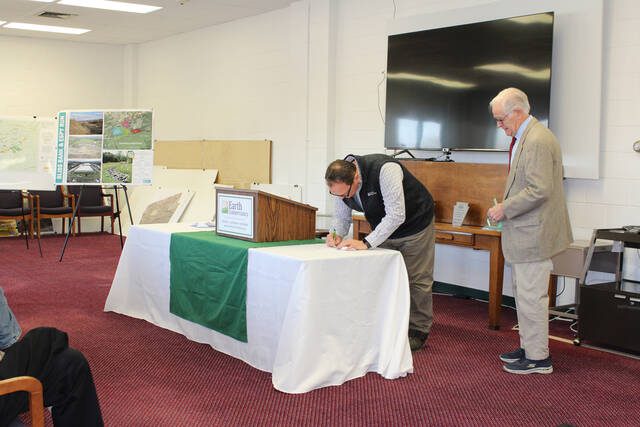ASHLEY — Thinking about the importance of the agreement he just signed, Steve Donches, president & CEO of the Industrial Archives & Library, said it in the best way.
“Basically, by opening this amazing collection for public access, we are giving back access to the community’s history — and that’s exciting,” Donches said.
In a big joint effort to protect and keep the old records of the former Glen Alden Corporation for research, Earth Conservancy (EC) of Ashley, Pennsylvania, and the Industrial Archives & Library (IAL) of Bethlehem, announced an agreement in which IAL will take ownership of the coal company’s records to prepare them and make them available for research by historians, scholars and the public.
The Glen Alden Coal Company, once the largest anthracite coal producers and employers in Lackawanna and Luzerne counties, was one of the main players in Northeast Pennsylvania’s well-known anthracite coal industry, which was a major part of the region’s economy.
In 1930 at its highest point, Glen Alden ran 26 collieries, employed 34,000 people, and made 13 million tons of coal.
Later, Glen Alden started dyeing its coal a famous blue color, and in 1966 sold off its mining wing as the Blue Coal Corporation.
With over 20,000 linear feet, the records stored at Earth Conservancy go back over a century and essentially represent the complete history of Glen Alden, Blue Coal, and their prior and related companies.
Blue Coal went bankrupt in 1976, leaving the company’s records to be neglected in a long bankruptcy process. Meanwhile in 1992, Earth Conservancy was established to put the former anthracite land back into productive use.
Then, in 1994, then-U.S. Rep. Paul Kanjorski got a $20 million dollar grant from the U.S. Department of Defense — $14 million of which was to buy all the corporation’s property, including its offices in Ashley and the company records, greatly aiding the work of Earth Conservancy and serving as an important resource for EC as it pursued its mission.
However, as EC started to think about and plan for the eventual completion of its work, it started looking for another suitable organization that could be the final guardian of the records.
“For many years, we at Earth Conservancy were concerned with finding an organization interested in the history of these great coal companies and capable of handling this immense task of organizing and properly storing a project of this magnitude,” said Terry Ostrowski, president & CEO of EC. “Fortunately, several years ago, the IAL was brought to our attention and our joint efforts since then have been dedicated to setting the stage for today’s action.”
Donches said IAL shares a deep concern with EC and others that the history of industrial America was being lost with the rapidly changing industrial landscape.
“And it is our mission to gather and keep for this and future generations those historical records of the great companies which had played a vital role in the growth of America,” Donches said. “Our staff has been developing and implementing a work plan that will ensure the safekeeping of this enormous treasure of the anthracite industry,” he added.
Nick Zmijewski, Archivist at IAL, stated that the Earth Conservancy Collection is very unique and complete.
“In some ways, it’s like the employees left on a Friday at 5 p.m. and never returned,” Zmijewski said. “Many records that would have been deleted have survived, allowing us to create a complete picture of the operations, from sales to mining to legal to personnel to real estate to engineering.”
Zmijewski mentioned that it will take a long time, perhaps decades, to fully handle the collection and make it accessible for research.
”But the collection will significantly enhance our understanding of mining in the Northern Field and will not only represent one company but the entire industry,” Zmijewski said. “I hope the public finds it as thrilling as we do, and I anticipate IAL providing regular access to these materials.”



